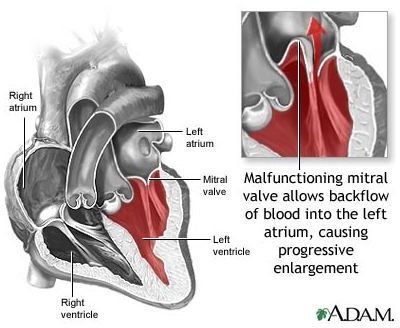Learn about Mitral Valve Prolapse Treatment
Mitral Valve Prolapse Overview
The heart consists of four chambers; two atria and two ventricles. As the heart beats normally, the left ventricle pumps oxygen-rich blood to the body. The mitral valve is an important element of the heart located between the left atrium and left ventricle. It opens when blood flows from the atrium to the ventricle and closes when the ventricle pumps the blood to the body.
Mitral valve prolapse (MVP) is a condition in which the valve is unable to close normally. Click on image to enlarge. Most people with MVP never have problems and do not require treatment. However, some can experience complications, including mitral valve regurgitation (blood leaks back into the atrium), arrhythmias and atrial fibrillation, and endocarditis (heart valve infection).
If symptoms do occur, they can include:
- Lightheadedness
- Migraine headaches
- Fatigue
- Palpitations
- Difficulty breathing, during physical activity or while lying flat
- Chest discomfort
- Cough
- Anxiety
Some examinations to diagnose this condition include chest x-ray, echocardiogram, and electrocardiogram (ECG).
The following are mitral valve prolapse treatments:
Medications
The doctor may prescribe medications like beta blockers to manage palpitations to beat more regularly and slowly, leading to blood pressure reduction. They can open blood vessels to improve blood flow and make blood vessels relax. Blood–thinning medicines (anticoagulants) are commonly advocated to decrease the risk of blood clots, especially when you have atrial fibrillation, which is a condition when the walls of the atria shiver rather than beating normally. Atrial fibrillation prevents the atria from pumping blood into the ventricles. Blood thinners include aspirin and Coumadin (warfarin).
Surgery
Your doctor might recommend open-heart surgery if mitral valve regurgitation is present. Mitral valve regurgitation would eventually result in heart failure, as the heart cannot pump blood properly. The surgeon makes an incision in the breastbone to expose the heart. The moment of the surgery is of utmost importance. If it is too late to perform surgery, heart impairment might have taken place, so your heart is at a greater risk for heart failure. There are two surgical options known as valve repair and valve replacement.
Valve Repair
Valve repair reduces the possibility of using blood-thinners for the rest of life. The risk of infection might be minimally reduced as well. This surgical procedure involves modifying the original valve to avoid backward blood flow. It is known as valvuloplasty. A surgeon might reconnect the leaflets of the mitral valve to allow the leaflets to close firmly. Likewise, the surgeon can perform an annuloplasty by repairing or replacing the ring around the valve (annulus) to make the leaflets swing shut.
Valve Replacement
If a valve repair is impossible to perform, your surgeon might decide on valve replacement. This means removing the original mitral valve and replacing it with an artificial one. There are two types of valves: mechanical and biological valves.
Mechanical valves may last a lifetime. Nevertheless, you need to take blood-thinning medicines forever to keep blood clot formation from occurring on the valve. Keep in mind that a blood clot that develops on the valve may escape to the brain, leading to a stroke.
Biological valves are derived from animal tissue, including from a pig or cow. You do not need to take blood-thinning medicines if a biological valve is used. However, these valves may need replacement because they only last about 10 years.
Follow-up Care
You have to stay in the hospital for about one to two weeks after surgery, although some patients may spend less than two weeks. Always consult your doctor to determine the best follow-up care.
References
Medicinenet.com: What is Mitral Valve Prolapse - https://www.medicinenet.com/mitral_valve_prolapse/article.htm
MayoClinic.com: Mitral Valve Prolapse - https://www.mayoclinic.com/health/mitral-valve-prolapse/DS00504
The National Heart Lung and Blood Institute: What is Mitral Valve Prolapse - https://www.nhlbi.nih.gov/health/dci/Diseases/mvp/mvp_whatis.html
Photo Credit
Image courtesy of the National Library of Medicine.
